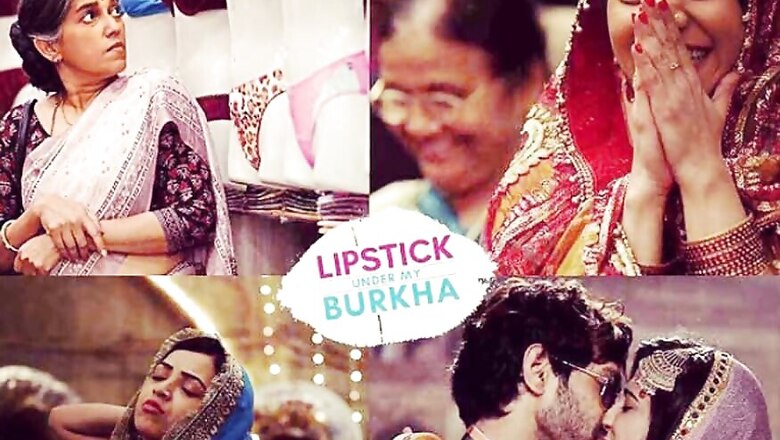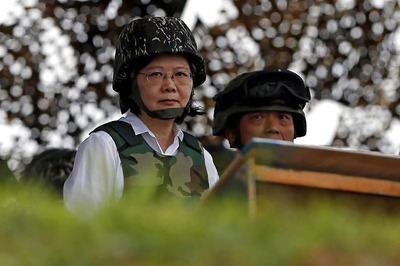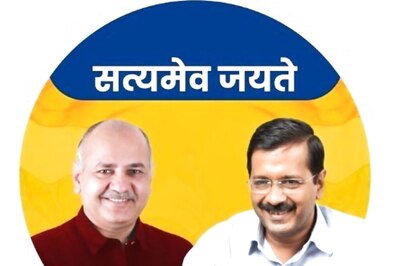
views
I got an email this morning that made its unwelcome way into my inbox. The subject line read 'These four women need your support'. On opening the email, I realised the 'support' that four women needed was for me to book my tickets for their movie 'Lipstick Under My Burkha'. The email was from a famous online aggregator of movie ticket bookings. "Watch the movie they didn't want you to see! When frustrated, desperate women dare to fight for their lives, it gives rise to a rebellion unlike any other," the email said.
I had already watched the movie. And I don't agree with this pitch.
The build up to the movie from all the brouhaha over the censorship had many of us anticipate the arrival of the film with much excitement. We went out in groups, to bond over the 'ladies oriented' film. It started off too on a good note with the Zeppelin belting Rihanna (Plabita Borthakur) making cool moves on the dance floor, Buaji's (Ratna Pathak Shah) not-so-pleased demeanor at being addressed the same way by a man her age, the bride-to-be Leela's (Aahana Kumra) unabashed sex life, and Shireen's (Konkona Sen Sharma) ingenious methods to sell her ware making her the best saleswoman of her company. But the women seem to get it all wrong after that. They all go lower and lower instead of higher and higher. One can make the argument that this shows the intersectional reality of our society. And yes, the film does bring to life characters we had not seen regularly on celluloid before and a few moment of heartwarming female bonding.
Let's rewind the movie from the eyes of one who cannot read between the layers. There are four women: Bauji, Leela, Rihanna and Shireen. Bauji and Leela are battling out their sexual fantasies, without ever being able to own it completely or even honestly. The two Muslim protagonists are both burkha-clad women who are using it as a powerful weapon to shoplift or spy. It basically serves as a tool for anonymity whenever it serves their purpose. All four are constantly working towards what they desire while also seeking the approval of the society. Buaji keeps up the pretense of going to satsangs daily while she goes for her swimming lessons with her handsome youngish instructor with whom she sex-chats anonymously over phone. The most out-spoken among the four, Leela, gets into a row with her boyfriend when he denies being her fiancé while they push a honeymoon scheme to clients complete with suggestive pictures of the two. The young Rihanna is ever ready to deny that she has never smoked or had a drink before to keep up her cool quotient while stuffing her burkha in the backpack. The last, mother of a brood, Shireen, inspite of having a Rs 40,000 per month job offer as a sales trainer, is still shy of calling out her out-of-job husband's affair or incessant marital rape.
The film doesn't make a case for what the women do with their talent, courage, position or intelligence. Instead it shows women who wish to break out but would lose everything at the end: freedom for Rihanna, social status for Bauji, love for Leela, and hope for a better life for Shireen. They somewhere got lost along the way. In that sense, yes, it's a film reflecting our real selves that are fallible, imperfect and yet should have the freedom to choose and dream.
The religious stereotypes are also very strong with an endless demonisation of men and victimisation of women. At the end of the day, for many these very issues will reinforce many stereotypes out there – Muslim men who only want sex from wives, the bearded glaring dominant Muslim fathers, or 'Musalle' who fool Hindu girls into love jihad. It also leaves the viewer with four women stuck with making wrong choices that were easy to make through lying, cheating or hiding in an oppressive society. The right choices are sometimes harder but they take you up, lift your spirits and leave your audience with immense possibilities.
Till the end of the movie, I kept waiting for the moment when I would be inspired to take out a red lipstick. Unfortunately, there came no such high point. I would rather root for characters that draw out the best of us no matter where we come from. As goes a common refrain: the lower they go, the higher we have to.
(Nazia Erum is a TEDx speaker and author of 'Mothering a Muslim' by Juggernaut Books. She can be reached at @nazia_e. Views are personal)




















Comments
0 comment